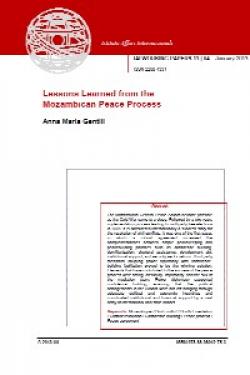Lessons Learned from the Mozambican Peace Process
The Mozambican General Peace Accord became possible as the Cold War came to a close. Followed by a two years implementation process leading to multiparty free elections in 1994, it is considered internationally a success story for the resolution of civil conflicts. It was one of the first cases in which a robust agreement increased the complementarities between simple peacekeeping and peacebuilding priorities such as confidence building, demilitarization, electoral assistance, development aid, institutional support, and security sector reform. Third party mediation coupling power diplomacy with confidence-building facilitation proved to be the winning solution. Elements that have contributed to the success of the peace process were timing, credibility, impartiality, and the skill of the mediation team. Power diplomacy supported confidence building, ensuring that the political arrangements in the Accord were not left hanging through adequate political and economic incentives and coordinated institutional and financial support by a vast array of international and state donors.
Versione rivista di un paper presentato al seminario internazionale su "Promoting peace and security in Africa. Lessons learned from Mozambique", Roma, 17 ottobre 2012.
-
Dati bibliografici
Roma, Istituto Affari Internazionali, 2013, 18 p. -
Numero
1304 -
ISBN/ISSN/DOI:
978-88-98042-75-3
Introduction
1. At the crossroads: the end of the Cold War and the changing context of pre-negotiations
2. Mediation: confidence-building versus power diplomacy?
3. The GPA: a "robust" guideline for peacekeeping and peacebuilding
4. Organization hazards and UN Security Council willpower
5. Ownership, coordination, flexibility and innovative financing
6. Nothing is permanent: democratic consolidation needs a shared understanding of all stakeholders
References




